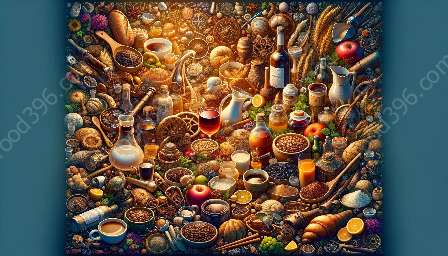Beverages have played a central role in human history, serving as a reflection of cultural, societal, and historical developments. From ancient times to the present day, the evolution of beverages has been intertwined with the very fabric of human civilization, shaping rituals, traditions, and social interactions.
Early Beginnings and Ancient Beverages
The history of beverages dates back to ancient civilizations, where the discovery and cultivation of various ingredients led to the creation of some of the earliest beverages. In Mesopotamia, the brewing of beer dates back to over 5,000 years ago, showcasing the early role of beverages in social and religious practices. Similarly, in ancient China, the production of fermented beverages such as rice wine held significant cultural and ceremonial importance.
These ancient beverages were deeply intertwined with cultural and societal practices. They were not only consumed for their nutritional value but also played a part in religious ceremonies and social gatherings. The brewing and consumption of these early beverages reflected the values and beliefs of these ancient cultures.
The Age of Exploration and Global Exchange
With the age of exploration came the exchange of beverages across different cultures and continents. The European exploration of the Americas led to the introduction of new beverages such as coffee, cacao, and various forms of tea to the continent. This exchange of beverages played a pivotal role in shaping global trade and cultural exchange, as well as influencing societal practices and rituals.
For example, the widespread popularity of coffeehouses in Europe during the 17th and 18th centuries not only fueled intellectual and artistic movements but also served as hubs for social and political discourse. Similarly, the introduction of tea to Britain became intertwined with British identity and societal practices, solidifying the tea culture that continues to be an integral part of British society today.
The Industrial Revolution and Modernization of Beverages
The industrial revolution brought about significant changes in the production, distribution, and consumption of beverages. The invention of canning and pasteurization revolutionized the preservation of beverages, leading to the mass production and global distribution of beverages such as beer, soda, and fruit juices.
This era also saw the rise of beverage companies and commercialization, shaping consumer behaviors and preferences. The cultural and societal significance of beverages continued to evolve, with the emergence of iconic beverages such as Coca-Cola and Pepsi-Cola becoming synonymous with modern consumer culture.
Beverage Studies: Exploring the Interdisciplinary Field
The study of beverages has evolved into a multidisciplinary field that encompasses anthropology, history, sociology, and cultural studies. Beverage studies delve into the cultural, societal, and historical significance of beverages, examining their role in shaping identities, rituals, and social interactions.
Through the lens of beverage studies, scholars explore the symbolic meanings of beverages, the rituals and traditions associated with their consumption, and the ways in which beverages reflect power dynamics and social hierarchies. This interdisciplinary approach allows for a comprehensive understanding of the cultural and societal significance of beverages across different contexts and time periods.
Conclusion: Beverages as Cultural Artifacts
Beverages have undeniably left an indelible mark on human history and society. From ancient ceremonial beverages to modern-day commercialized drinks, the history of beverages provides a rich tapestry of cultural, societal, and historical significance. Beverage studies offer a platform to delve deeper into the intricate relationship between beverages and human civilization, shedding light on the ways in which beverages have shaped and reflected cultural and societal dynamics throughout history.

